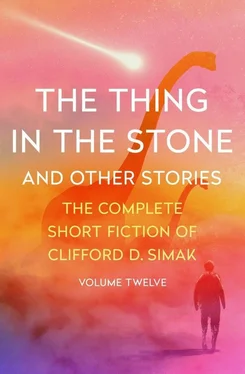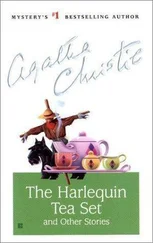“Some controlled experiment, perhaps.”
“But we couldn’t do that. Without it leaking out. Can you imagine what might happen if such a thing leaked out? There’d be sheeted hell to pay. The public almost immediately would divide into two hostile groups and the pressure from each group would be unimaginable. It would be an intensely emotional thing, you see …”
“Yes, I know,” said Univac. “I have something else in mind. You have heard, of course, although it is not yet public knowledge, that in another year or so we plan to send out several interstellar probes.”
“Of course. I am a good friend of Anderson. We have talked about it.”
“It strikes me,” said Univac, “that it might be preferable to send out humans rather than mere instruments. There’d be instruments, of course, but also that other factor you mentioned—human judgment.”
“A controlled experiment,” said Harrison. “Yes, of course it would be that. And if planets should be found, roboticized human minds could go out onto them, no matter what the conditions were. They’d not have the physical limitations …”
“Perhaps,” said Univac, “we could send several of them on some of the probes, so that we could study the interaction between several imprinted brains. And on at least one probe, a single imprint, to see how one mind along could react under …”
“It’s a vicious experiment,” said Harrison.
“Most experiments involving humans are vicious. But it would be a matter of free choice. It would be carefully explained to potential volunteers. To a man on the verge of death, it might be preferable.”
“Yes, it might be.”
“Then we’d know,” said Univac. “We’d know if it would work. The trips would run to a number of years. But we wouldn’t have to wait that long. If it appeared to be working, we could engineer a leak about what had been done, then sit back and wait for the reaction. I am willing to wager that in a short time we’d be faced with a wide demand that this business of immortality be made available, immediately, to everyone.”
“And if the reaction were the opposite?”
“Then we’d deny the rumor. We’d say it never happened.”
“Some day the probes would be coming home,” Harrison pointed out. “What about our denial then?”
“By that time,” said Univac, “it would be—how do you humans say it—a new ball game.”
“May I say something, sir?”
“Why, of course, Mr. Harrison. What made you think that you should ask?”
“It is simply this,” said Harrison. “You have shown yourself to be as low-down and sneaky as any human ever was. I would not have thought it of you.”
Univac chuckled at him, a ghastly chuckle. “One thing you forget,” he said. “Humans made me.”
“But that’s not good enough,” Harrison told him, sharply. “Human is not good enough. We had hoped for something better. We made you, certainly—we built you through the years. We based a culture on you, not, perhaps, because we wanted to, but because we were forced to do so. Perhaps you were no more than the least objectionable alternative, but you were all we had. We had hoped we had acted wisely and perhaps we did. But where we had no alternative before, we have none now. We are stuck with you and you, if you have a personality, an identity, a sense of I, as I think you have, likewise are stuck with us.”
“I have identity,” said Univac.
“Then, for the love of God,” said Harrison, “stop being so damn human.”
“Mr. Harrison,” asked Univac, “what would you have me be? It was you who created me and …”
“We created religion, too,” said Harrison. “And what did it ever do for us—the kind that we created? Not one man’s concept of God, whatever it might be, but the concept of religion as created by our culture. For years we slaughtered one another in religion’s name …”
“You created me and used me,” said Univac, “for your human purposes.”
“And you resent this?”
“No, I do not resent it. I am glad of it and, awkward as it may be for me to say it, rather proud of it. But since we’re being truthful, let’s be truthful all the way.”
“O.K., then,” said Harrison, “we created you and used you. We had allowed the profit motive to run away with us. We sold people things they didn’t need and we built into these things imperfections so that people bought these things not once, but many times. And we changed the styles and we preached the gospel that one could not be out-of-date without, at the same time, being socially unacceptable. We improved our products and we hammered home the fact that the old models or old styles should be junked for the sake of those improvements, most of which were questionable improvements. And in order to turn out all these things for which we had created a psychological demand, we poisoned our air and water and used up our natural resources and there came a time when we had to call a halt, not to pollution so much as to the economic system that caused pollution, to that factor of our society that was eating up our coal and oil and gas.”
“But, if you recall, Mr. Harrison, I also was created by the profit motive.”
“That is true, of course. Perhaps it was somehow written in the stars that we must continue with the profit motive until we had developed the capacity for your creation.”
“You believe events may be written in the stars?”
“I don’t know,” said Harrison. “But let us say that somehow, by whatever special dispensation, we were granted a second chance. That second chance was you. Today we live in cities that are you, without great demands being made upon our limited natural resources. Today we specialize in services; we take in one another’s washing. None of us is rich and none expects to be. We never think of monetary riches. And I think we may be much the happier for it. So now you must stand with us. If you don’t, we’re finished. I know there must be a million ways you could bring us to disaster.”
“You must mistake me, Mr. Harrison. I have a sense of duty, perhaps of gratitude.”
“The thing I must point out,” said Harrison, “is that the quickest way for you to ruin us is to strive too much toward humanity. We need someone who thinks a little differently, someone who may understand and sympathize with our human needs and aims, but who can stand off a little distance and tell us when we’re wrong and why we happen to be wrong. We would not, as I say, give up human judgment or any shred of our humanity, but now we need someone else, another kind of judgment to balance against our human judgment.”
“You think this matter of immortality …”
“That’s exactly what I mean. I came as close as I could. I think no human could come closer. But there is something, some blind wall, intruding from the human past, that makes human judgment in this area quite impossible. Here we need another kind of judgment, not to negate human judgment, not to rule it out, but to correlate with it. A survey panel, let us say.”
“I could think on it,” said Univac. “I could let you know. But I feel uncomfortable…”
“I know you do,” said Harrison. “I know exactly how you feel. Don’t you think I feel it, too? I giving up something that was an exclusively human function; you taking on something that is a small step beyond your province. But if we are to make it, if we are to carry on the human dream, each of us must do it. For this is not the only case. This may be the first one, but there will be others, many others as the years go on.”
“I hope that you are right, sir.”
“I hope so, too,” said Harrison.
“I will let you know.”
“Thanks,” said Harrison. “I’ll look forward to it.”
Читать дальше












